Introduction
Gabapentin, a widely prescribed medication, is primarily used to manage seizures and neuropathic pain. However, it also comes with a range of side effects, including potential implications for mental health. One of the most pressing concerns among users and healthcare providers alike is whether gabapentin can cause or exacerbate depression. This article delves into the evidence linking gabapentin to depressive symptoms and other mood changes, aiming to offer a comprehensive overview of its mental health implications.
How Gabapentin Works and Its Common Uses
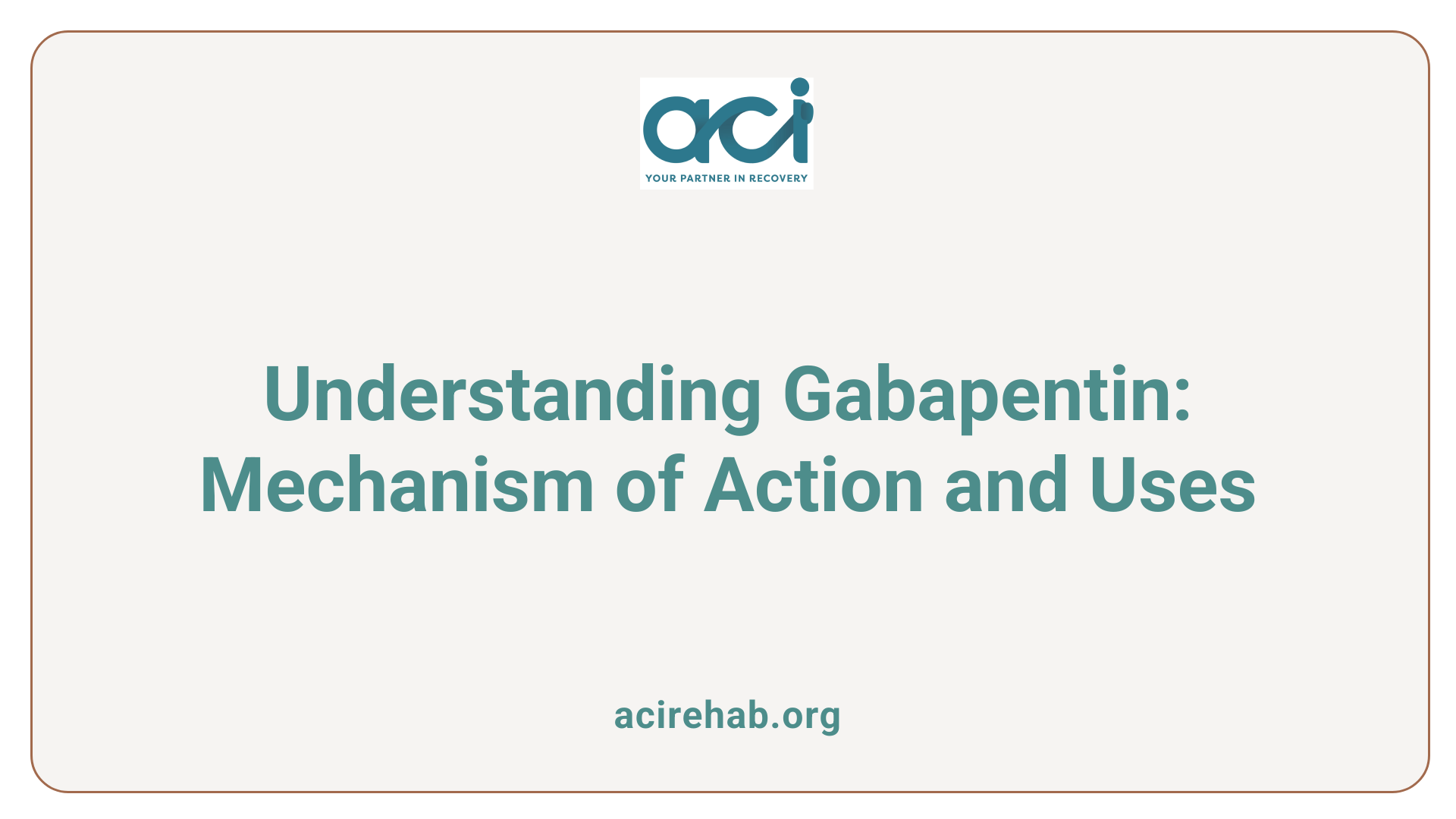
Gabapentin’s Mechanism of Action
Gabapentin primarily functions by influencing the central nervous system. It works by modulating the release of certain neurotransmitters, particularly gamma-aminobutyric acid (GABA). This helps regulate neuronal excitability and has a calming effect on the brain, which can alleviate symptoms of pain and prevent seizures. It is believed that gabapentin, while not directly acting on GABA receptors, enhances GABA’s inhibiting effects indirectly, providing relief for both neuropathic pain and seizure disorders.
Additionally, gabapentin interferes with the transmission of pain signals to the brain, which assists in managing conditions like neuropathic pain, making it useful in various therapeutic contexts.
Common Medical Indications for Gabapentin
Gabapentin is prescribed for a variety of conditions, including:
- Epilepsy: As an adjunctive treatment for partial seizures.
- Neuropathic Pain: Effectively helps patients with chronic nerve pain, particularly in conditions such as diabetic neuropathy and postherpetic neuralgia.
- Restless Legs Syndrome: Can reduce the discomfort and restlessness experienced at night.
- Anxiety Disorders: Occasionally used off-label for generalized anxiety disorder.
Despite its use, gabapentin is not approved by the FDA specifically for depression or other mood disorders, although it has been considered in challenging cases. Its effects can vary significantly based on individual patient profiles, emphasizing the importance of monitoring its impact on mood and behavior.
Gabapentin and Organ Impact
What organ does gabapentin affect?
Gabapentin primarily affects the central nervous system, where it is utilized for pain management and seizure control. While it generally has minimal effects on the liver and kidneys, caution is advised for individuals with pre-existing kidney issues due to the risk of drug accumulation and related side effects. In rare instances, gabapentin can lead to serious allergic reactions, potentially affecting organ health. Therefore, while its main target is the nervous system, gabapentin’s implications for overall health warrant careful monitoring.
| Condition Treated | Indication | Notes on Usage |
|---|---|---|
| Epilepsy | Adjunctive therapy for seizures | Effective in reducing seizure frequency |
| Neuropathic Pain | Chronic pain management | Eased through modulation of pain perception |
| Restless Legs Syndrome | Symptom relief | Helps in reducing nighttime discomfort |
| Anxiety Disorders | Off-label usage | May be used when traditional treatments fail |
Understanding Gabapentin’s Psychiatric Effects
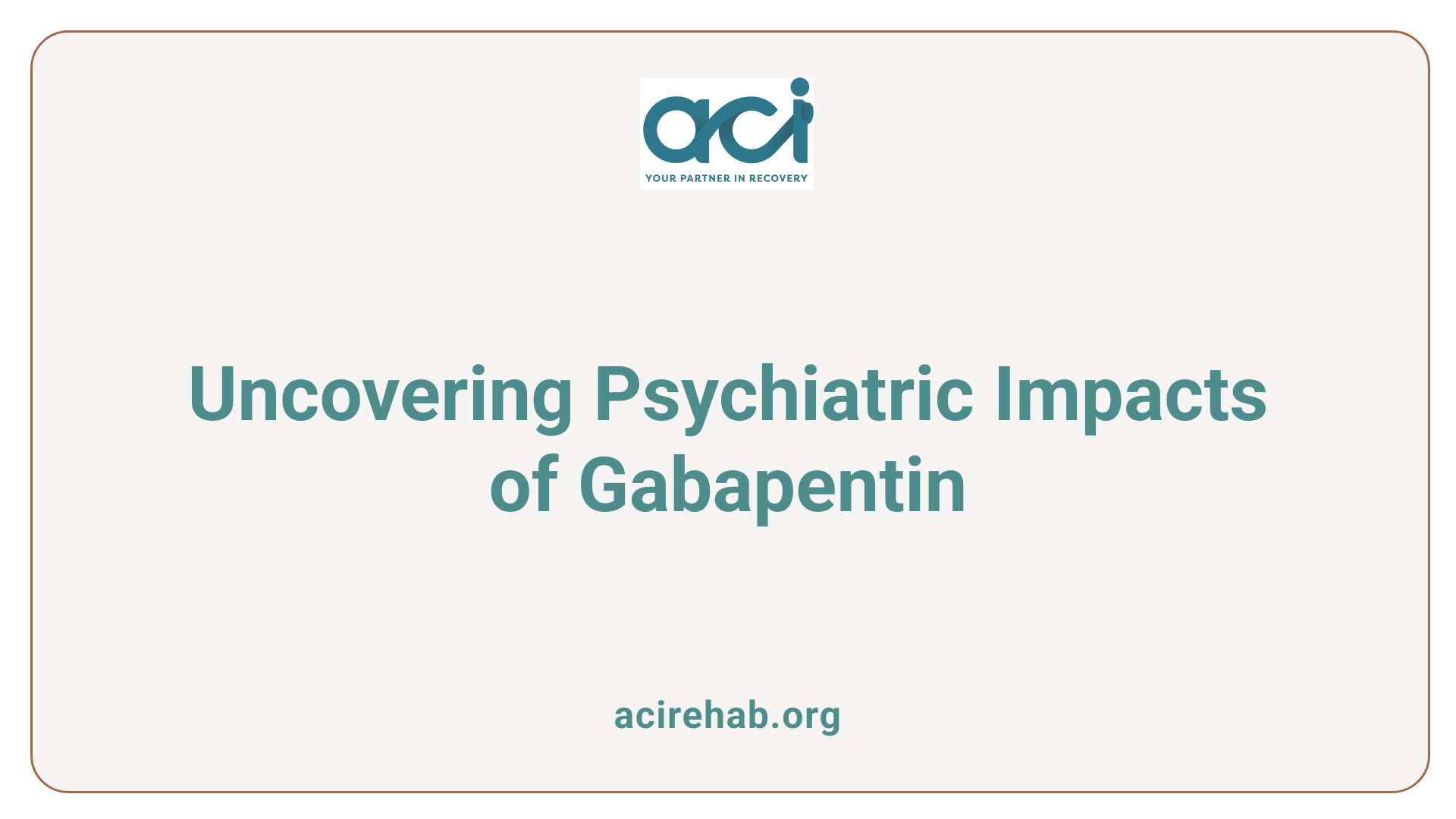
Potential psychiatric side effects of gabapentin
Gabapentin, commonly prescribed for seizures and neuropathic pain, has been reported to cause a range of psychiatric side effects. While it is generally considered safe, some users have exhibited significant mood changes, including increases in depression, anxiety, and irritability.
Notably, studies and case reports have indicated that gabapentin may provoke or exacerbate mood disorders in susceptible individuals. Given this potentiality, healthcare providers should screen patients for any underlying psychiatric conditions prior to prescribing gabapentin. Changes in personality and aggression levels have also been observed in some cases, putting a spotlight on the importance of monitoring mental health while on this medication.
Link between gabapentin and depression
Does gabapentin affect your mood and can it cause depressive symptoms?
Gabapentin can affect mood and may cause depressive symptoms, though this is considered a rare side effect. While it is primarily used to treat seizures and nerve pain, some individuals have reported experiencing feelings of sadness or worsening depression during treatment. Those with a history of psychological disorders or pre-existing mood conditions may be at higher risk. Gabapentin’s impact on neurotransmitter balance, such as increasing GABA levels, could potentially contribute to mood changes. It is essential for individuals experiencing these symptoms to consult their healthcare provider for appropriate monitoring and management.
It has been documented that withdrawal from gabapentin can further exacerbate depressive symptoms, indicating a complex relationship between the medication and mood disorders. Close monitoring from healthcare providers is crucial to mitigate these risks effectively and derive a suitable treatment course that prioritizes mental health.
| Psychiatric Effect | Description | Importance of Monitoring |
|---|---|---|
| Depression | Gabapentin can exacerbate or initiate depressive symptoms. | Consult a healthcare provider for changes in mood. |
| Aggression | Increased aggression reported in some users. | Monitor behavioral changes closely. |
| Suicidal Ideation | Potential link to increased thoughts of self-harm. | Immediate medical attention needed if experienced. |
Gabapentin may serve various therapeutic roles, but careful consideration of its psychiatric implications is vital for effective treatment. Users are encouraged to remain vigilant regarding their mental health while under gabapentin treatment.
Uncovering Evidence: Gabapentin and Depression
Case studies linking gabapentin to depression
Numerous case studies illustrate the potential psychiatric side effects of gabapentin, particularly concerning depression. For instance, one specific case documented a patient who experienced severe mood changes, including heightened aggression and depression, after starting gabapentin. Remarkably, these symptoms subsided following the discontinuation of the medication, suggesting a possible connection between gabapentin and emotional turmoil.
Another troubling case involved a patient who faced significant increases in frustration and aggressive behavior that culminated in an unfortunate suicide attempt. After stopping gabapentin, the patient’s suicidal ideation reportedly diminished, reinforcing concerns about the medication’s impact on mental health. These cases underscore the importance of monitoring individuals for mood changes while taking gabapentin, especially those with pre-existing psychiatric conditions.
Research findings on gabapentin’s mood effects
Research surrounding gabapentin’s role in mood regulation has yielded mixed results. While acute case studies highlight the risk of depression and suicidal ideation, controlled trials have not definitively linked gabapentin usage to a history of depression. Notably, gabapentin has been shown to influence neurotransmitters like GABA, which can affect mood. However, its efficacy in treating mood disorders remains controversial and lacks robust clinical backing.
Moreover, some studies suggest that depression may arise not only as a side effect but could be exacerbated in individuals with existing psychological disorders. Reports indicate that long-term use may lead to persistent mood alterations. Therefore, healthcare providers are advised to screen for mental health issues before prescribing gabapentin, ensuring a proactive approach in managing potential adverse effects.
Gabapentin Use: Risks and Safety Measures
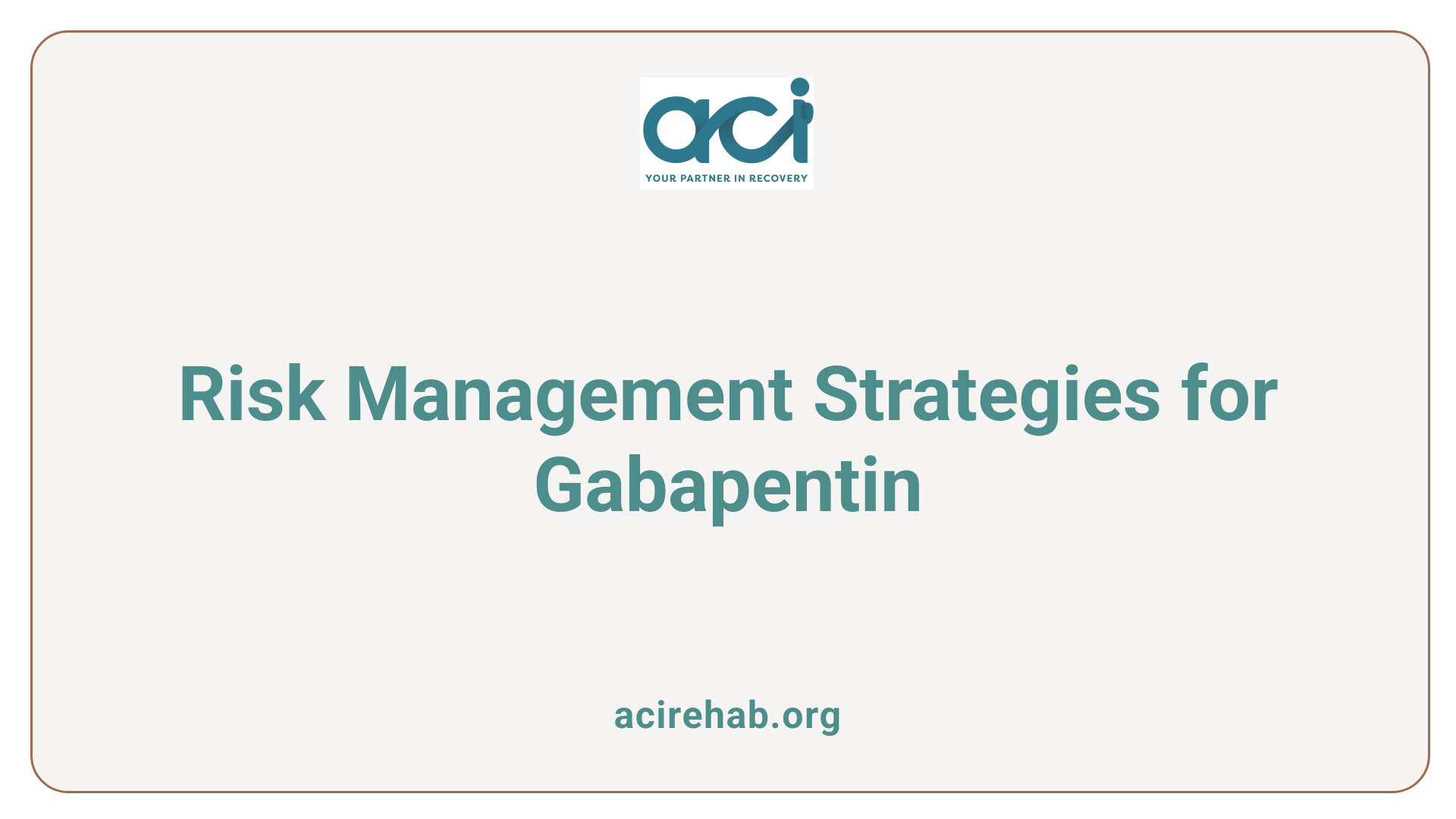
Safety Protocols for Gabapentin Use
Gabapentin, primarily an anticonvulsant medication, requires careful consideration before prescribing, particularly for individuals with existing psychiatric conditions. Given its potential side effects, such as mood changes, depression, and even suicidal ideation, healthcare providers must be diligent in screening patients. This includes evaluating any pre-existing mental health disorders that could be exacerbated by gabapentin.
Patients are advised to monitor for new or worsening signs of depression, such as feelings of sadness or irritability, especially during the initial stages of treatment. If such symptoms arise, they should consult their healthcare provider promptly, as discontinuation of the medication may be necessary.
Management of Psychiatric Side Effects
Managing the psychiatric side effects of gabapentin can involve a multipronged approach. Techniques such as cognitive behavioral therapy and lifestyle modifications can benefit mental health. In some cases, adjunct medications like SSRIs or tricyclic antidepressants may be prescribed to alleviate symptoms of depression.
It is crucial for both patients and healthcare providers to maintain open lines of communication. Individuals should report any significant mood shifts or feelings of self-harm, enabling timely interventions. The possibility of withdrawal also necessitates a gradual tapering off gabapentin under medical supervision to mitigate mental health complications.
| Strategy | Description | Purpose |
|---|---|---|
| Screening | Evaluate for psychiatric history before prescribing | To identify and manage risks early |
| Monitoring | Watch for mood changes and suicidal thoughts | To enable timely intervention if symptoms arise |
| Cognitive Therapy | Implement behavioral therapy techniques | To enhance coping mechanisms |
| Medication Adjustment | Consider adjunctive SSRIs or tricyclics if needed | To address depression symptoms effectively |
Case Studies and Reports: Analyzing the Impact
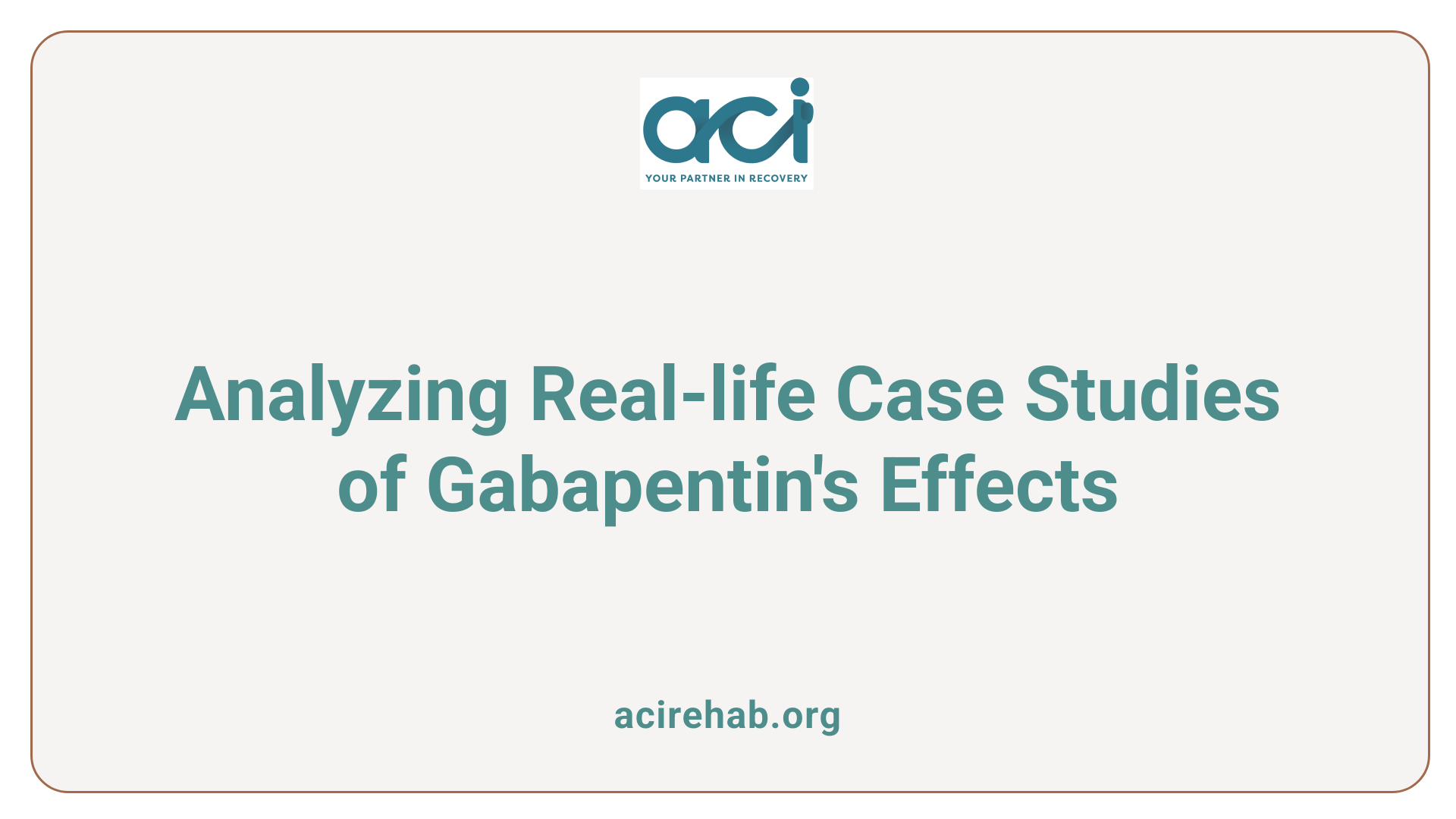
Examples of mood changes post-gabapentin usage
Gabapentin has been associated with a variety of mood changes, including increased aggression, depression, and suicidal thoughts. Reports show that some patients experienced significant personality shifts, which included notable increases in depressive symptoms and aggression after starting the medication. For instance, there have been documented cases where individuals reported feelings of sadness, agitation, and irritability over the course of their treatment. In children, these mood variations can be particularly concerning, potentially leading to long-term psychological impacts.
Analysis of specific patient cases
A key case study involved a patient whose mental health deteriorated after beginning gabapentin therapy, culminating in a suicide attempt. Fortunately, these suicidal ideations diminished post-discontinuation of the drug, raising questions about a possible causal link between gabapentin and depression.
Another study highlighted that a small percentage of chronic pain sufferers experienced worsened depressive symptoms while on gabapentin. Notably, in the context of bipolar disorder, some patients did not show significantly worsened depressive symptoms, suggesting that the drug’s impact may vary according to underlying conditions.
In essence, while gabapentin is effective for pain and seizures, its potential to evoke severe mood changes warrants careful monitoring and evaluation by healthcare providers.
Monitoring Mood Changes During Gabapentin Treatment
Indicators of mood changes
Patients taking gabapentin should be vigilant for signs of mood alterations. Key indicators include:
- Increased depression: Sudden feelings of sadness or hopelessness.
- Aggressive behavior: Unusual irritability or feelings of agitation.
- Suicidal thoughts: Discussions of self-harm or feelings of worthlessness.
- Loss of interest: Disinterest in activities that were once enjoyable.
These symptoms are crucial to monitor, especially since gabapentin can exacerbate pre-existing mood disorders in susceptible individuals.
Strategies for addressing mood disorders
Managing potential mood-related side effects of gabapentin involves several strategies:
- Healthcare consultation: Regularly discuss any mood changes with a healthcare provider.
- Screening psychiatric disorders: Prior screening for existing mood disorders can help assess risks.
- Psychotherapy: Cognitive Behavioral Therapy (CBT) can be beneficial in addressing mood swings.
- Medication adjustment: Healthcare providers may consider modifying the gabapentin dosage or switching to another medication if necessary.
It is vital for patients to maintain open communication with their healthcare providers and to seek immediate help if they notice any severe mood changes, ensuring safe and effective treatment.
Long-term Use and Psychiatric Implications
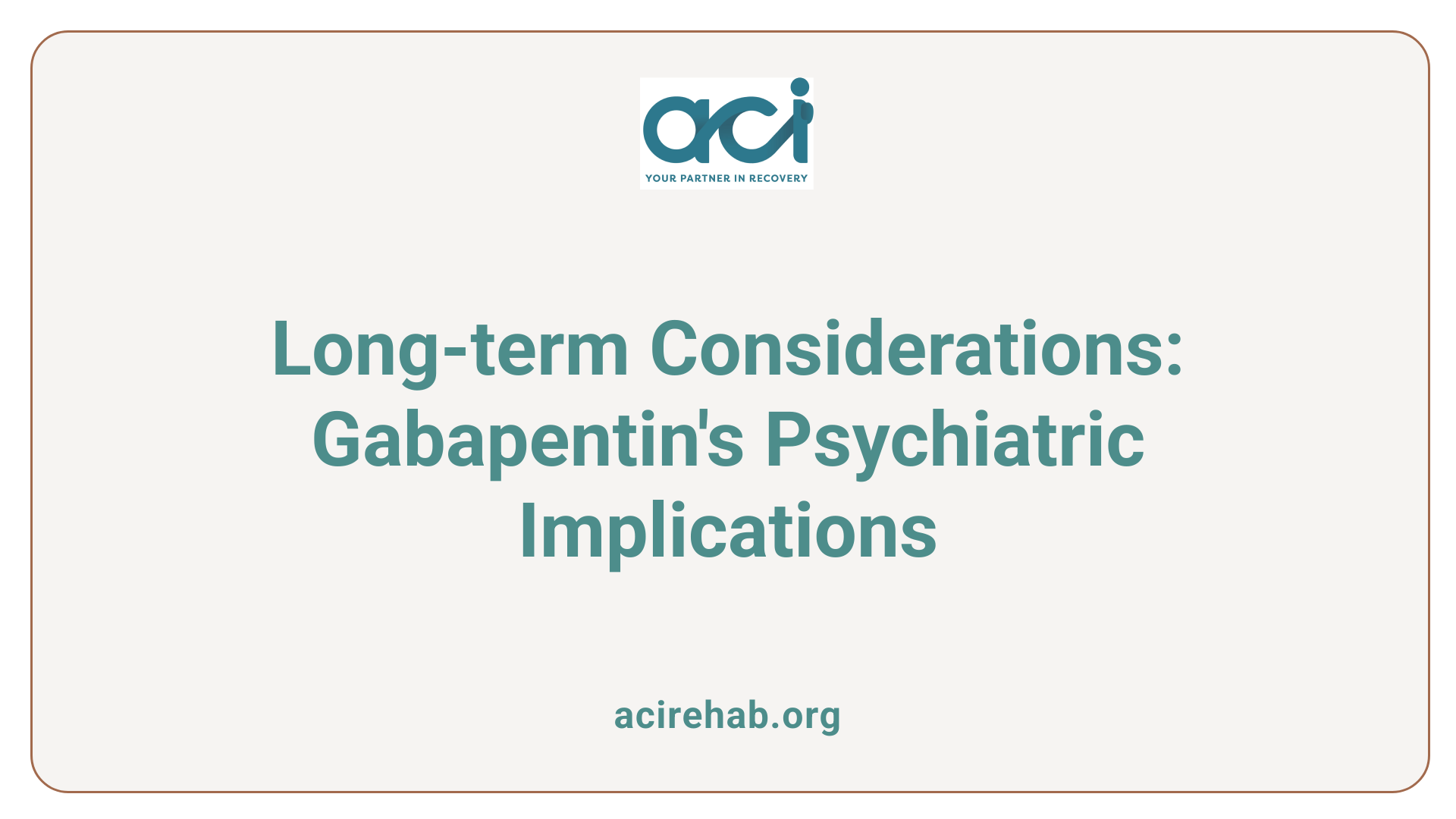
Effects of prolonged gabapentin usage
Long-term use of gabapentin has been associated with various psychiatric side effects. Notably, some users may experience mood changes, which can include increased feelings of sadness, irritability, or hopelessness. Reports indicate that chronic use may exacerbate existing mental health issues, particularly depression. In certain cases, withdrawal from gabapentin can also reveal or worsen symptoms of depression and anxiety, placing added stress on individuals who are already vulnerable.
Mental health considerations
When prescribing gabapentin, it’s critical for healthcare providers to screen for underlying psychiatric conditions. Gabapentin may lead to significant personality changes, including aggressive behavior and heightened depression, particularly in patients with pre-existing mental health issues. The increase in suicidal thoughts among some patients necessitates careful monitoring, especially during the initial treatment stages and upon discontinuation of the medication.
Here’s a summary of the potential psychiatric implications associated with long-term gabapentin use:
| Potential Side Effects | Description | Risk Group |
|---|---|---|
| Depression | New or worsened symptoms can arise over time. | Individuals with history of mental health issues. |
| Aggression | Can manifest as increased irritability. | Susceptible patients. |
| Suicidal Ideation | Thoughts may develop, requiring immediate attention. | Patients under treatment. |
| Withdrawal Effects | Anxiety and depression may intensify post-cessation. | All users considering stopping. |
Gabapentin’s compound effects on mental health emphasize the importance of ongoing dialogue between patients and providers regarding mood changes during treatment.
Comprehensive Answer to the Common Side Effects
Most reported side effects of gabapentin
The most common side effect of gabapentin is dizziness, affecting approximately 17-28% of individuals who take the medication. Other frequently reported issues include sleepiness, impacting around 19-21% of users. Patients may also experience:
- Poor muscle control
- Fatigue
- Swelling in arms and legs
- Dry mouth
- Diarrhea, nausea, and weight gain (less commonly).
Severe yet rare side effects associated with gabapentin
While generally safe, gabapentin can lead to serious but rare side effects. These may include:
- Mood changes such as increased depression, aggression, or suicidal ideation, particularly in vulnerable populations.
- In patients with pre-existing psychiatric disorders, gabapentin may exacerbate symptoms.
- Serious respiratory issues can arise, especially when combined with CNS depressants.
Given these risks, monitoring and communication with a healthcare provider are essential, particularly for individuals with underlying mental health conditions. Patients should especially avoid combining gabapentin with substances like opioids and alcohol due to the heightened risk of complications.
Conclusion: Weighing the Benefits Against the Risks
Overall Assessment of Gabapentin’s Mental Health Impact
Gabapentin, primarily used as an anticonvulsant and for neuropathic pain relief, poses several risks regarding mental health. While many patients experience notable relief from their symptoms, some report adverse psychiatric effects, including increased aggression, depression, and even suicidal ideation. Specific case studies highlight significant personality changes associated with gabapentin use, emphasizing the medication’s potential to exacerbate pre-existing mental health disorders.
Despite these occurrences, well-controlled research has yet to establish a definitive causal relationship between gabapentin use and depression. It’s noted that some individuals may experience mood-related side effects, suggesting a need for cautious prescribing.
Recommendations for Those Considering Gabapentin
Healthcare providers are urged to carefully screen for any underlying psychiatric conditions before prescribing gabapentin. Patients should be monitored for mood changes such as agitation, sadness, or feelings of hopelessness during treatment. If patients notice such changes, it is crucial to consult a doctor promptly. Additionally, patients should not abruptly stop the medication without professional guidance to avoid withdrawal symptoms or complications that might aggravate mental health issues. Regular follow-ups can help manage any emerging psychiatric side effects effectively and ensure patient safety.
Final Thoughts
While gabapentin is an effective medication for certain conditions, its potential impact on mental health cannot be overlooked. Current evidence suggests that gabapentin can lead to mood changes and depressive symptoms, especially in individuals with an existing history of psychiatric disorders. Therefore, it’s crucial for patients and healthcare providers to weigh the benefits against the potential mental health risks. By maintaining open communication and vigilant monitoring, individuals can manage these risks effectively while reaping the therapeutic benefits of gabapentin.
References
- Can Gabapentin Cause Depression? – Conifer Park
- Gabapentin-related suicide: Myth or fact? – PMC – PubMed Central
- 13 Gabapentin Side Effects You Should Know About – GoodRx
- Can Gabapentin Cause Depression? – Steps to Recovery
- Short- and Long-Term Effects of Gabapentin (Neurontin) | Greenhouse
- Gabapentin | Uses, Side Effects, & Addiction – Sandstone Care
- Side effects of gabapentin – NHS

